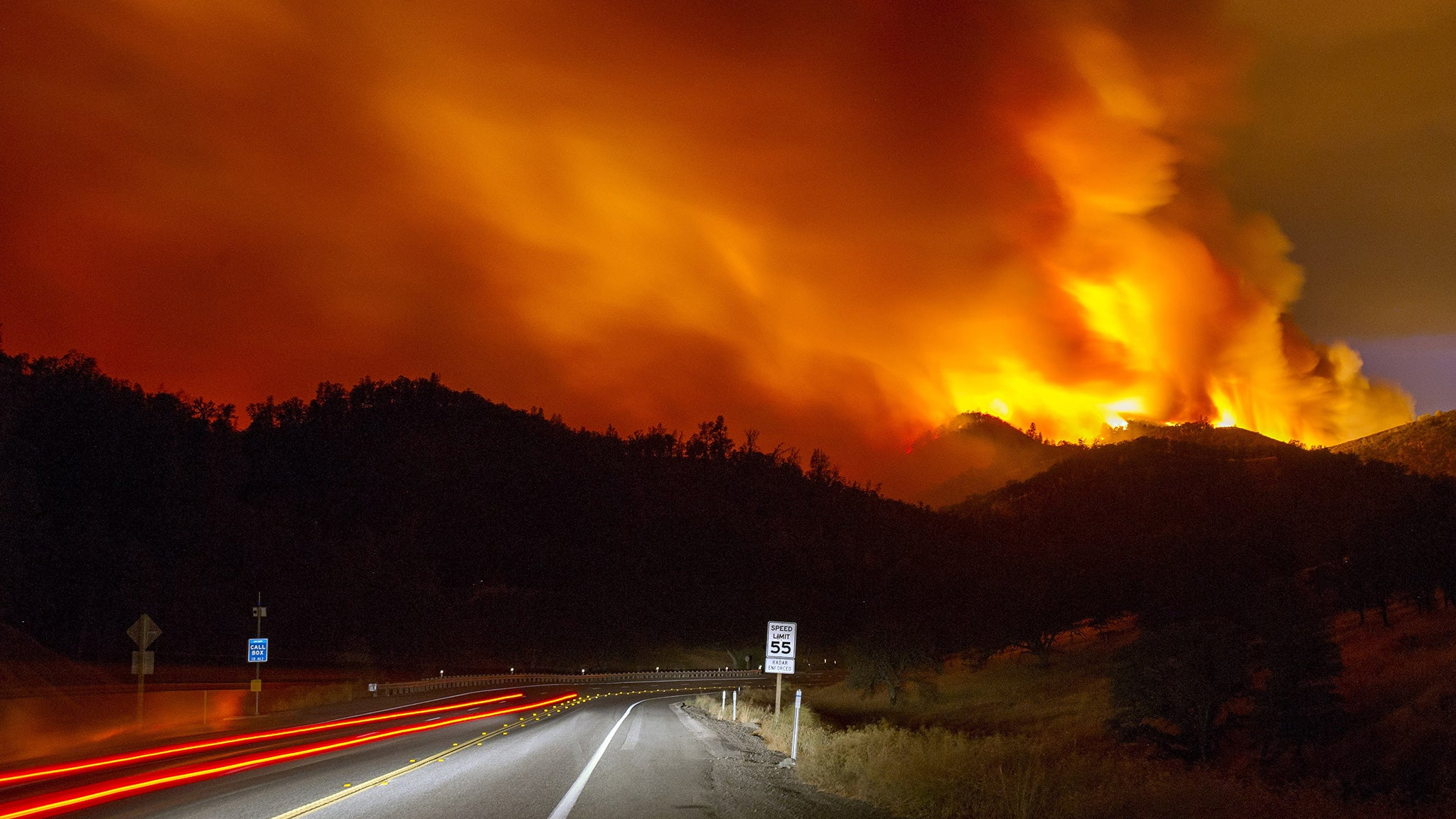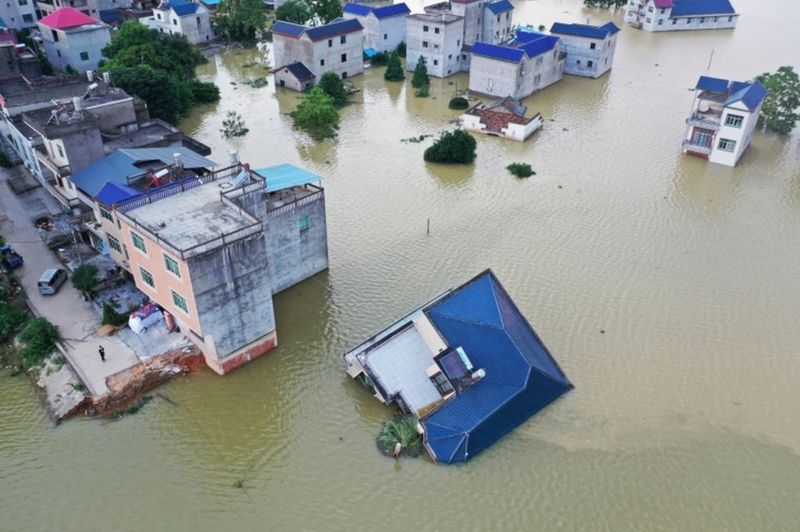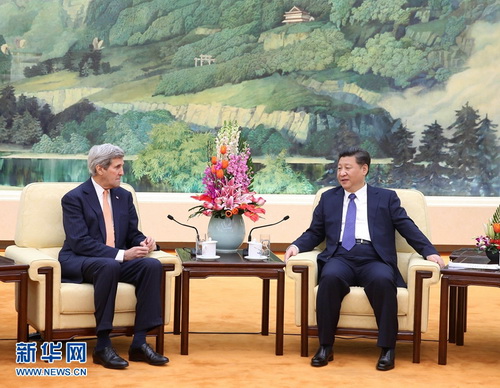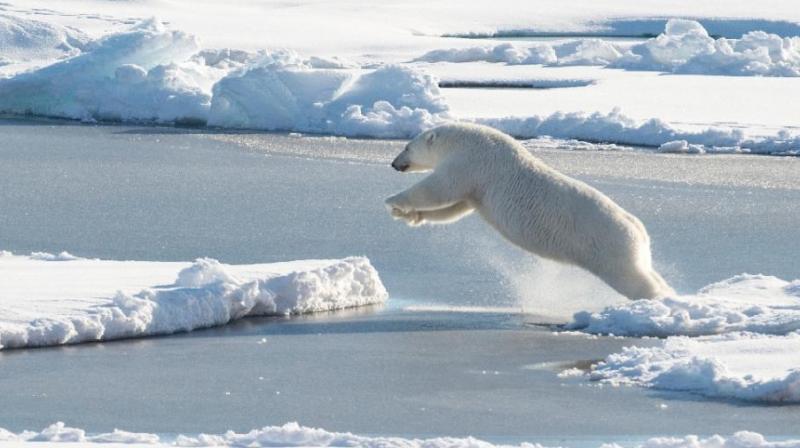
This summer, China was struck by the worst flooding in decades with torrential rains and landslides affecting more than 37 million people across 27 provinces. Across the Pacific, some 9,000 fires have burned over 4 percent of the land in the U.S. state of California this fall, shattering the record in the Golden State's modern history.
Houses on fire, villages inundated, people evacuated … millions of lives have been upended in the two countries over the past few months, in the midst of an unfolding climate crisis that is being felt keenly throughout the world.
While major economies work together to deal with this critical issue, U.S. President Donald Trump has reversed much of the work of his predecessors, calling climate change "a hoax." The policies of aborting or loosening around 100 environmental regulations of the U.S., the world's second largest greenhouse gas emitter, have negatively impacted the global climate, which may not recover in decades ahead. As two of the world's largest greenhouse gas emitters, China and the U.S. are in positions to push the planet toward the path of no return, or work together to stave off rising temperatures worldwide.

Heavy rainfall hits a village near Poyang Lake, east China's Jiangxi Province, July 15, 2020. /AFP
Heavy rainfall hits a village near Poyang Lake, east China's Jiangxi Province, July 15, 2020. /AFP
U.S. President-elect Joe Biden's new cabinet, at the very least, seems willing to cooperate with China in this arena. By appointing John Kerry as climate envoy, Biden's team intends to convey a sense of return to normalcy, or at least to a pre-Trump era. "America will soon have a government that treats the climate crisis as the urgent national security threat it is," Kerry tweeted after Biden announced his new role – the first ever climate leader in U.S. history.
His assuming the role harks back to Obama's presidency, during which expertise and global leadership were lauded, not vilified. The 76-year-old seems to embody these qualities in spades – as the secretary of state during the Obama years, he was the key U.S. official in shaping the Paris climate agreement, in which 171 signatory countries including major emitters such as the U.S. and China had pledged to reduce carbon emissions within a set timeline.
Soon after Donald Trump took office in 2016, he and his team undid much of the Obama administration's work in this area, withdrawing from the 2015 agreement and doing away with regulations that restricted drilling and mining in regions that would upset natural ecosystems.
This time around, Kerry's appointment will see him take a more active role in helping the U.S. transition away from coal, oil and natural gas toward renewable energy, among other commitments in combating catastrophic climate change. The envoy role looks to be more than symbolic – Biden's transition team said that the position will have a seat on the National Security Council, making it the first time that the presidential advisory body will have an official dedicated to combating climate change.

Chinese President Xi Jinping (R) meets with then U.S. Secretary of State John Kerry at the Great Hall of the People in Beijing, China, January 27, 2016. /Xinhua
Chinese President Xi Jinping (R) meets with then U.S. Secretary of State John Kerry at the Great Hall of the People in Beijing, China, January 27, 2016. /Xinhua
In terms of China and the U.S. working together, Kerry in his New York Times op-ed made a call for China to agree to the creation of protected zones near Antarctica that would prohibit fishing and other industrial activities. This exhortation for international cooperation signifies his willingness to cooperate on issues of global concern, beyond geopolitics. He is also a consummate diplomat with experience in engaging diplomatically with China – after all, he met with Chinese President Xi Jinping in 2016 at the Great Hall of the People, where they discussed bringing further cooperation to the China-U.S. relationship.
While the U.S. is steeped in climate change limbo, China stepped up its international commitments, with President Xi pledging that the country will be carbon-neutral by 2060.
"China has been focusing on cutting greenhouse emissions for years. Now it's starting to talk about climate adaptation," said Fang Li, China director of the World Resources Institute (WRI), during an interview with CGTN on the sidelines of the sixth China and Globalization Forum.
China is severely hit by climate change, with its sea levels rising faster than the global average. "China has to take into account climate change which is key to its sustainable development," said Fang. The government is formulating a climate adaptation strategy by 2035.

Polar bears were listed as threatened under the Endangered Species Act in 2008 because of the loss of sea-ice habitat. /AFP
Polar bears were listed as threatened under the Endangered Species Act in 2008 because of the loss of sea-ice habitat. /AFP
Since 2008, Beijing and Washington have worked closely in environmental protection. The China-U.S. Energy Track II Dialogue brought together environment experts, economists and business leaders to brainstorm on energy and climate change. The dialogue, which came to a halt in 2016, is expected to resume with a new U.S. cabinet coming in. "It's hard for China and the U.S. to return to the good old days of climate collaboration between 2008 and 2016 given geopolitical power shifts, but at least we can work together in drawing up rules," noted Fang, also a senior fellow of Science & Research at the WRI.
Biden pledged to return to the Paris climate accord and invest $400 billion in clean energy research and innovation over 10 years – the biggest investment plan in combating climate change. His appointment of Kerry will likely boost U.S. collaboration with China in mitigating climate risks.
In 2009, Kerry, then chairman of the Senate Foreign Relations Committee, attended the U.S.-China Clean Energy Forum with Hillary Clinton in Beijing. As secretary of state from 2013 to 2017, the veteran senator traveled to China every year, pushing forward climate cooperation amid escalated tensions over the South China Sea in those years. Kerry set up a bipartisan coalition – "World War Zero" in 2019, calling for zero carbon emission.
The ability of the former U.S. secretary of state to bring together disparate parties would be invaluable in setting up a coalition whose members have overlapping interests.
Even if Kerry, in his new role, is willing to extend an olive branch, will those efforts be able to overcome the deepening competition between China and the U.S.? The collision in trade and technology between the two powerhouses shows few signs of abating. The Biden administration intends to have the U.S. reengage with global commitments and leaders who were sidelined by Trump, yet the country's hardline position against China has gone mainstream in domestic politics.
How much progress the two countries can make in containing climate change in the upcoming years will depend on more than talks at the table, with cooperation requiring a willingness to negotiate and ability to compromise, both of which are in need of sore return when it comes to international diplomacy.

